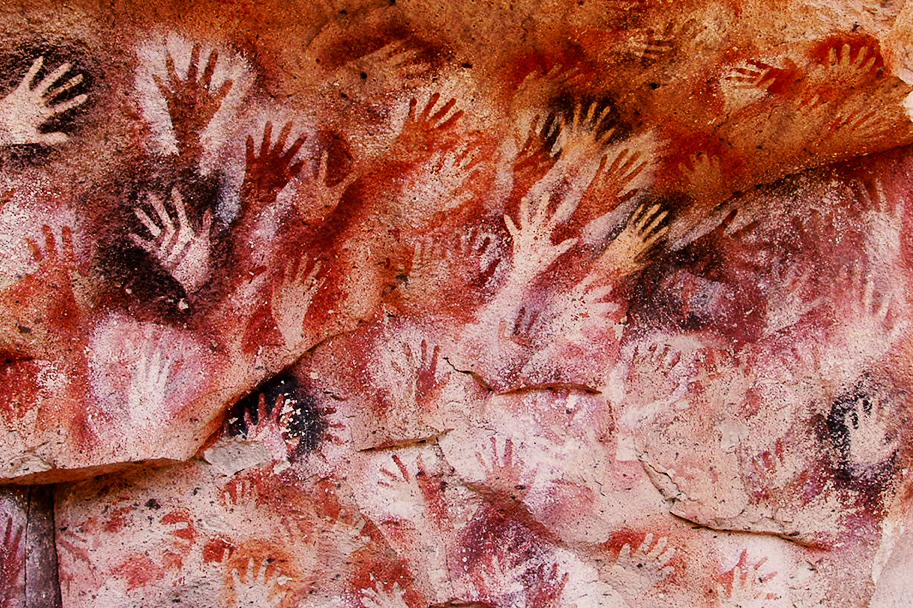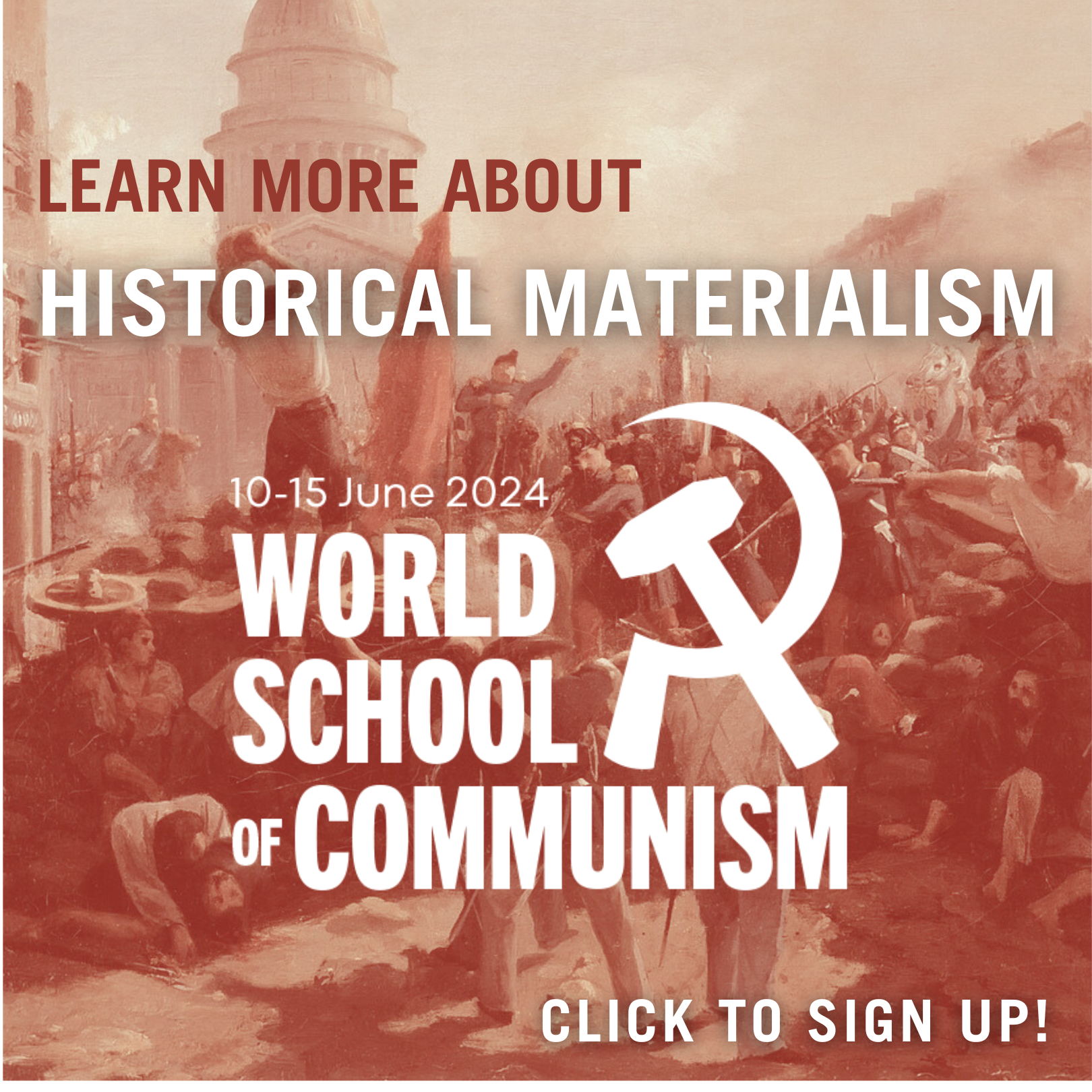The Dawn of Everything, by the anarchist anthropologist, David Graeber, and archaeologist, David Wengrow, has been widely promoted as a radical new vision of human history both in the mainstream press and on the left. In this article Joel Bergman subjects this work to a rigorous Marxist critique, and exposes the fatal flaws inherent in the authors’ idealist view of historical development.
In the autumn of 2021, a new book titled, The Dawn of Everything: A New History of Humanity, by anthropologist David Graeber and archaeologist David Wengrow, was published to widespread acclaim in the mainstream media. Coming from Graeber, an anarchist well known for his involvement in the #Occupy movement who passed away in 2020, the book has been welcomed by many on the left. However, upon closer examination, The Dawn of Everything turns out to be a conservative apology for the status quo, which undermines our ability to understand society and therefore transform it.
A new science of history?
The Dawn of Everything presents us with a bold promise by any standards. The authors claim to have “upended the conventional narrative” and further, they “will not only be presenting a new history of humanity, but inviting the reader into a new science of history, one that restores our ancestors to their full humanity.”1
The central thesis in this book is that human beings can change our social structure regardless of our material conditions. Indeed, the entire method of this book is to argue that ‘human agency’ – free will – and ideas are the determining factors in the development of history and that the only laws governing historical development are those “we make up ourselves.”2
For the vast majority of human history, the authors argue that we “moved back and forth fluidly between different social arrangements, assembling and dismantling hierarchies on a regular basis.”3 Therefore, we are told, the scientific method of looking for the determining factors of social development beyond the human mind, not only denies our ancestors their agency and therefore their ‘humanity’, but is based on false assumptions and must be abandoned.
Consequently, the various materialist explanations that have been put forward for phenomena such as the rise of kingship, class exploitation and the oppression of women, are simply ‘myths’, which only cloud our understanding of the past. Instead, we should be asking “how we got stuck” in the belief that we cannot organise society differently.4 This turning point is the so-called ‘Dawn of Everything’ the book is named after – the moment all our ideas about how society can be organised became fixed.
This represents a huge attack on any scientific study of history and, as we shall see, on Marxism in particular, albeit in a more disguised form. But even if we judge The Dawn of Everything on its own terms, their idealist method makes it impossible for Graeber and Wengrow to provide us with any answers to the questions they pose. Unsurprisingly, in over 600 pages of text and notes, the authors never explain how we “got stuck”.
Free will and determinism
The counterposing of ‘freedom’ to what Graeber and Wengrow call ‘determinism’ actually just returns us to an old philosophical debate about the relationship between freedom and necessity. Applied to the history of humanity, this is a debate about the extent to which the events and institutions that arise throughout history are shaped by the free choice of the individuals who make up society, or by objective laws beyond their knowledge and control.
For thousands of years philosophers and historians have grappled with an apparent contradiction: On the one hand, historical events are made up of the actions of individuals who are conscious human beings, motivated by their own will; but on the other hand, the development of human society as a whole shows a remarkable degree of uniformity, which supports the idea that it is driven by laws which are independent of any human will.
Marx famously resolved this contradiction as follows: “Men make their own history, but they do not make it as they please; they do not make it under self-selected circumstances, but under circumstances existing already, given and transmitted from the past.”5
 For Marx, relations of production are not fixed for all time / Image: public domain
For Marx, relations of production are not fixed for all time / Image: public domain
Earlier historians had recognised that our ideas do not fall from the sky but are shaped by our environment, including the social conditions into which we are born. But they became trapped in an infernal cycle when they attempted to explain the sources of these conditions.
Institutions such as the state and private property were considered the product of the constitutions of the various societies that have existed throughout history. And what determined the customs laid down in these constitutions? The ideas of the ‘great men’ who wrote them. Their ideas were explained by reference to even older ideas, and so on and so forth until refuge was finally sought in the great final cause of all history: human nature, or God.
It was Marx who discovered a way out of this dead end. He established the basic fact that the development of human society was first and foremost dependent on the development of the productive forces. In other words, the development of the way in which humans interact with their surroundings to produce the material necessities of life forms the bedrock on which human society is built.
The way humans produce their sustenance Marx called a ‘mode of production’, something inherently social, in which they enter into certain relations which are “indispensable and independent of their will.”6 Upon this material foundation of society, culture, politics and ideology arise. As Marx explained: “The mode of production of material life conditions the general process of social, political and intellectual life. It is not the consciousness of men that determines their existence, but their social existence that determines their consciousness.”7
For Marx, relations of production are not fixed for all time by human nature or anything else. They change along with the development of production itself. Therefore, the emergence of new ideas of how to run society, and the great revolutions that have overturned previously dominant ways of life, are not arbitrary events or the product of a single great genius but, in the last analysis, the reflection of deep changes in the material foundations of society.
But this does not mean that humans are robbed of ‘agency’. After all, history is made up of nothing other than the actions and choices of human beings. Rather, the Marxist view of history rejects the superhuman power that had wrongly been inserted in the place of real, human activity.
As Engels explained: “Freedom does not consist in the dream of independence from natural laws, but in the knowledge of these laws, and in the possibility this gives of systematically making them work towards definite ends.”8 In this way, the study of human society was placed on a genuinely scientific basis for the first time.
Unfortunately, according to Graeber and Wengrow, it is precisely this scientific approach, which Marx and Engels developed more than anyone else, that has been leading us astray. But how do they approach this question? Paraphrasing Marx, they start by stating, “We make our own history, but not under conditions of our choosing.”9 But they continue to completely negate this same idea by then claiming that, because there is “no way to know” how much difference ‘human agency’ actually makes, “precisely where one wishes to set the dial between freedom and determinism is largely a matter of taste.”10 Thus in reality, what is hidden behind Graeber and Wengrow’s confusing caveats, is a complete surrender to the idea of ‘free-will’ as the main determinant of human history.
The authors explain, “Since this book is mainly about freedom, it seems appropriate to set the dial a bit further to the left than usual,”11 with “the left” favouring freedom as opposed to determinism. The rest of the book is essentially a series of more or less contrived attempts to prove the premise they arbitrarily adopted at the start.
By such means, however, it becomes impossible to explain anything. After all, if the answer to the question, ‘Why does a certain people live a certain way?’ is always, ‘Because they chose to’, the question immediately arises: “Why did they choose to?” Graeber and Wengrow’s response to this question is simply to list the various ideas that different societies had about how people should live. But all this amounts to saying is that people chose to live a certain way because they thought that it was the proper way to live.
If this sounds like a rather circular way of studying the past, that’s because it is. The fatal flaw of all historical idealism stems from the fact that the very thing to be explained, the ideas of human beings, is taken as the starting point of the investigation. This inescapable problem is epitomised by the method of so-called ‘analysis’ applied throughout the book, in which the results of the authors’ investigations are predetermined by whatever pet ideas or prejudice they wish to impress us with. The only surprise is the tortuous means by which the facts are contorted to fit the theory.
It would require hundreds of pages to respond to every case study presented or misrepresented in the book, so it will be necessary to confine this review to only the most important and representative arguments the authors make.
‘Bold social experiments’
In the first chapter, titled ‘Farewell to Humanity’s Childhood,’ Graeber and Wengrow argue against the common belief among anthropologists that early hunter-gatherer societies were egalitarian, with little to no inequality of wealth or power, stating that this is a way of “infantilising”12 early humans and depriving them of ‘agency’.
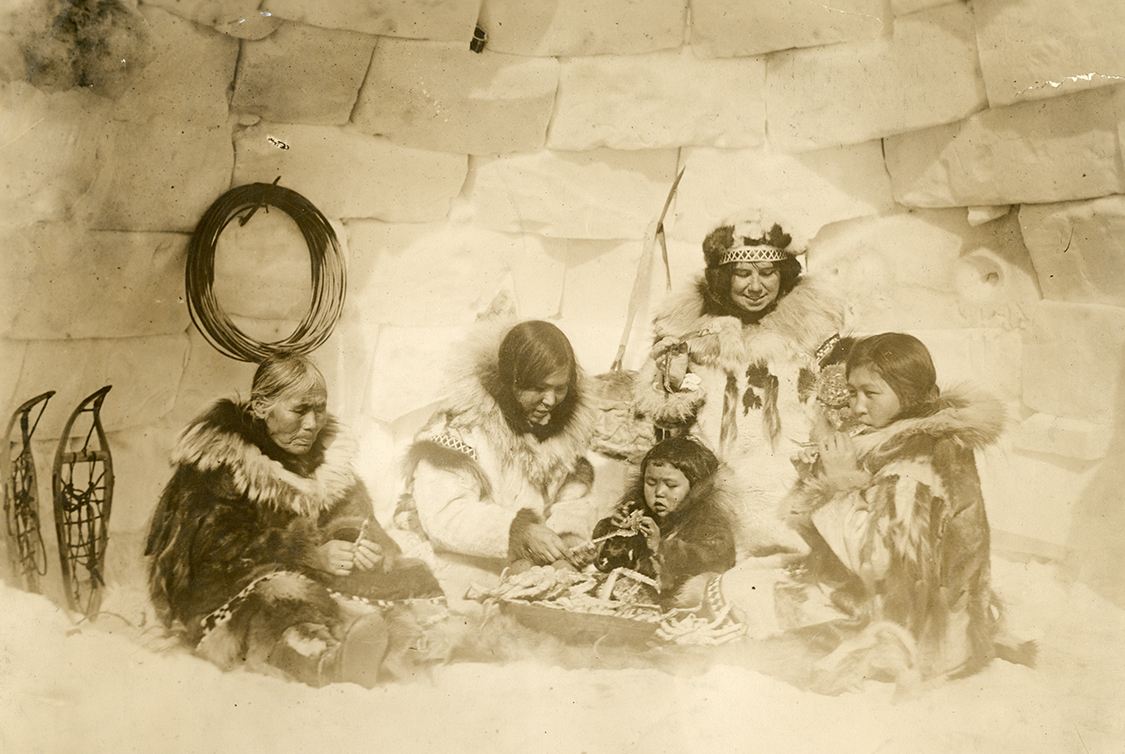 Inuit family in 1924 / Image: public domain
Inuit family in 1924 / Image: public domain
Instead, they claim that, for the vast majority of our species’ existence, humans engaged in “bold social experiments” and that society resembled “a carnival parade of political forms”13, which, we are told, backs up the general premise that we can choose our social structure regardless of material conditions. But this premise is never actually proven.
The closest the authors get to evidence of societies moving “fluidly between different social arrangements” are examples of hunter-gatherer societies that varied their social structures with the rhythm of the seasons.14 They reference the Nambikwara who live in the Amazon; the Lakota of the North American plains; and the Inuit from Northern Canada, Greenland and Alaska.
According to Graeber and Wengrow, all three of these societies adopted more or less hierarchical social structures at different times of the year. Taking the Inuit as an example, anthropologists reported that they had two separate social structures, one in summer and one in winter. In the summer, the Inuit were spread out into small family groups under a rigid hierarchy headed by the male head of the family, while in the winter they all congregated together in larger communities where a more egalitarian lifestyle predominated.
Attempting to support their general theory about humans consciously choosing their social structure, Graeber and Wengrow claim that the Inuit were doing this “on the understanding that no particular social order was ever fixed or immutable.”15 They cite French anthropologist Marcel Mauss who studied the Inuit and draw the conclusion that: “To a large extent, he concluded, Inuit lived the way they did because they felt that’s how humans ought to live.”16 What groundbreaking insight! However, the problem with this is that this is not at all what Mauss argued.
When discussing the seasonal variation of the Inuit, Mauss explained that: “Summer opens up an almost unlimited area for hunting and fishing, while winter narrowly restricts this area. This alternation provides the rhythm of concentration and dispersion for the morphological organisation of Eskimo society. The population congregates or scatters like the game. The movement that animates Eskimo society is synchronised with that of the surrounding life.”17
In other words, the Inuit adapted their social organisation to their natural environment and the resources available to them at different times of year. Even Inuit spirituality was structured around the differing conditions in which they procure food and whether or not there is an abundance. In the winter, which in the arctic regions lasts for nine months of the year, these spiritual traditions were based around not offending animal spirits in order to guarantee a good hunt. During this time, there were all sorts of taboos and a very strict tradition of sharing out all of the food. If this were not the case, society would likely perish. The groups that developed these traditions were the ones that were able to survive in these harsh conditions.
However, in the short summer period, families would disperse to take advantage of the plethora of newly available hunting/fishing opportunities, and stockpile a surplus to help them weather the winter period. In the arctic very little grows, so big game hunting provides the vast majority of the calorie intake. This was usually performed by men, who therefore assumed leadership of the family groups, which were temporarily restructured so as to best facilitate the hunt.
Far from being an example of a society moving consciously between different stages of development, the Inuit remained at all times a society of communistic hunter-gatherers, who adopted more rigid forms of leadership in a temporary and restricted fashion in order to best ensure the production and reproduction of life. That the Inuit “felt that’s how humans ought to live,” is hardly surprising, but this feeling does not disprove the fact that their way of life had evidently been determined by their material environment, and by the mode of production of their means of subsistence.18
As we shall see, a similar phenomenon occurs throughout the book where the authors misrepresent anthropologists, distort the facts and ignore anything that does not suit their narrative.
No origins?
Having thus argued that societies have adopted all kinds of political forms, irrespective of their stage of economic development, Graeber and Wengrow also turn their attention to an arguably even more important question: did our prehistoric ancestors live communistically?
In his book, The Origin of the Family, Private Property and the State, Engels demonstrated that, far from being immutable characteristics of our society, private property, the state and the patriarchal family have not always existed. Drawing from modern anthropological studies at the time, particularly those of Lewis Henry Morgan amongst the Iroquois of New York State, Engels demonstrated that our early ancestors lived under what he called ‘primitive communism’. In these societies concepts of private property were unknown and all things beyond personal possessions were held in common.
Since the publication of Engels’ work anthropologists and archaeologists have studied hundreds, if not thousands, of prehistoric sites and modern hunter-gatherer societies. The overwhelming majority of these have concluded that early human society must have been communistic, or ‘egalitarian’, echoing Engels’ findings. Even The Dawn of Everything references American anthropologist Christopher Boehm and British anthropologist James Woodburn, who separately studied dozens of hunter-gatherer societies and came to the conclusion that early humans must have been egalitarian.
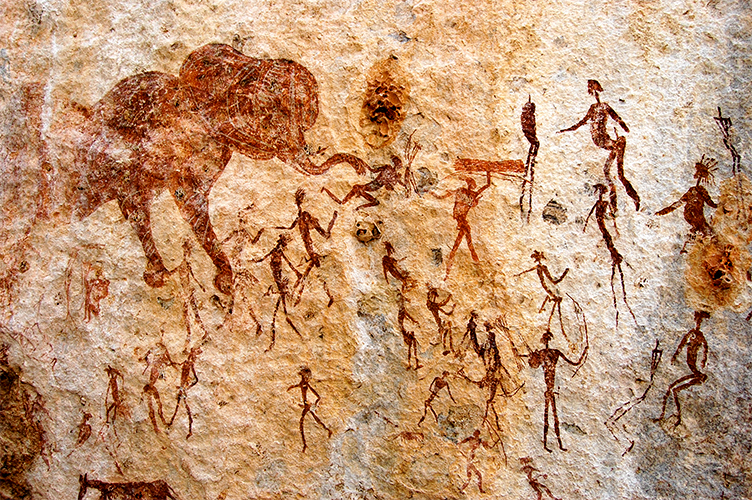 Prehistoric rock art site near Mutoko, Zimbabwe / Image: Robert Stewart Burrett
Prehistoric rock art site near Mutoko, Zimbabwe / Image: Robert Stewart Burrett
Things began to change with the transition from hunting and gathering to societies based on farming and animal husbandry, which the Marxist archaeologist, Vere Gordon Childe, famously described as the ‘Neolithic Revolution’. This period marked a huge development in the productive forces of humanity, and for the first time, a stable surplus became possible. Corresponding with this, the seeds of private property and class society were planted. Eventually a ruling class rose to power, appropriating the surplus product, cementing the exploitation of the labouring masses and building a repressive state apparatus to defend their privileged position. This process took place independently and at different times in several locations across the world.
This explanation poses a problem for Graeber and Wengrow, because it suggests that the peoples who adopted the institutions of class society did so under the pressure of material circumstances, arising from developments in the productive forces and the mode of production of material life, and not simply because they ‘chose’ to do so. Exploding this ‘myth’ therefore takes up the bulk of The Dawn of Everything.
The first point of attack is the very idea that prehistoric hunter-gatherer societies were communistic to begin with. Graeber and Wengrow posit that social stratification and inequality have always existed and therefore prehistoric society could not be described as truly communistic, or ‘egalitarian’. But as we shall see, instead of deriving their theory from the facts, they attempt to shoehorn the facts into their theory.
For all their over-confident statements, all The Dawn of Everything comes up with to try to prove that inequality has always existed is a few burial sites found in western Eurasia during the upper palaeolithic, which they refer to as “princely burials”.19 But later on in the book, they are forced to recognise that those buried at such sites are most likely individuals who were revered because of their physical deformities and nothing like a privileged upper class. In fact, the authors are forced to acknowledge that it is “highly unlikely” that society was divided “along lines of status, class and inherited power” thousands of years before the origins of farming.20
The authors then resort to a game of definitions, arguing for instance that because there is no common definition of the word ‘equality’ there was therefore no egalitarian past. They play a similar game in relation to the origins of private property. In chapter four, they state: “If private property has an ‘origin’, it is as old as the idea of the sacred.”21 Expanding on this, they say that Amazonians believed that “almost everything around them has an owner, or could potentially be owned, from lakes and mountains to cultivars, liana groves and animals.”22
But who would ‘own’ these things? Not individuals, not even groups collectively, but supernatural entities. Indeed, the authors accept that in other hunter-gatherer societies, “Often, the true ‘owners’ of land or other natural resources were said to be gods or spirits; mortal humans are merely squatters, poachers, or at best caretakers.”23
The authors’ wordplay does not change the fact that the common spiritual notion among hunter-gatherers that sacred beings ‘own’ the forest, the lakes, the rivers and mountains etc., actually means precisely the opposite of what Graeber and Wengrow try to make it mean: that these things cannot be owned by anyone. This is because these were communistic hunter-gatherer societies and it confirms precisely what a materialist theory of social evolution would predict.
The ‘indigenous critique’
In the second chapter, titled ‘Wicked Liberty: The Indigenous critique and the myth of progress’, Graeber and Wengrow attempt to disprove the existence of primitive communism using first-hand testimony from the kind of society that Morgan and Engels based their theories on.
The bulk of the chapter is devoted to the “indigenous critique” of European, capitalist society by the late 17th century Huron-Wendat leader, Kandiaronk. They quote Kandiaronk’s criticism of French society:
“I affirm that what you call ‘money’ is the devil of devils, the tyrant of the French, the source of all evils, the bane of souls and a slaughterhouse of the living. To imagine one can live in the country of money and preserve one’s soul is like imagining one can preserve one’s life at the bottom of a lake. Money is the father of luxury, lasciviousness, intrigues, trickery, lies, betrayal, insincerity – of all the world’s worst behaviour. Fathers sell their children, husbands their wives, wives betray their husbands, brothers kill each other, friends are false – and all because of money.”24
Kandiaronk continues:
“I have set forth the qualities that we Wendat believe ought to define humanity: wisdom, reason, equity, etc. and demonstrated that the existence of separate material interest knocks all these on the head. A man motivated by interest cannot be a man of reason.”25
He criticises European society further, stating that, “all sorts of crimes are committed upon the score of Mine and Thine”, and suggests that the French should follow the example of the Wendat:
“If you abandoned conceptions of mine and thine, yes, such distinctions between men would dissolve; a leveling equality would then take its place among you as it now does among the Wendat.”26
What else is this but an impassioned communist critique of class society? This should not be surprising, because Kandiaronk lived in a classless society where wealth was held in common. But astoundingly, Graeber and Wengrow seek to distort the obvious meaning of Kandiaronk’s words. In a passage rejecting the argument that differences in wealth eventually become translated into differences of power, the authors state: “Recall that the American indigenous critique, as we described it in Chapter Two, was initially about something very different: the perceived failure of European societies to promote mutual aid and protect personal liberties.”27 But this is not what Kandiaronk said at all.
The authors claim that Kandiaronk “had trouble even imagining that differences of wealth could be translated into systematic inequalities of power.”28 But Kandiaronk for his part seems to have had a fairly good understanding of the way in which material conditions, most notably “separate material interests,” determined the social structure of European society at that time.
This is a particularly dishonest application of the idealist method, where the authors develop an idea a priori and then try to make the facts justify it.29
The fact is that in Huron-Wendat society the means of production were held in common and the social structure was relatively egalitarian, with no ruling class or state structure as we know it.
The role of agriculture
The authors then attack the idea that the advent of agriculture and the domestication of animals laid the material basis for social classes. They explain, “it’s also assumed that without the productive assets (land, livestock) and stockpiled surpluses (grain, wool, dairy, products etc.) made possible by farming, there was no real material basis for anyone to lord it over anyone else.”30 They then reject this ‘assumption’, pointing to the example of an indigenous people from the Northwest coast of Canada, the Kwakiutl, who practised slavery, in order to prove the existence of social inequality without agriculture or livestock, and therefore without a basis in production.
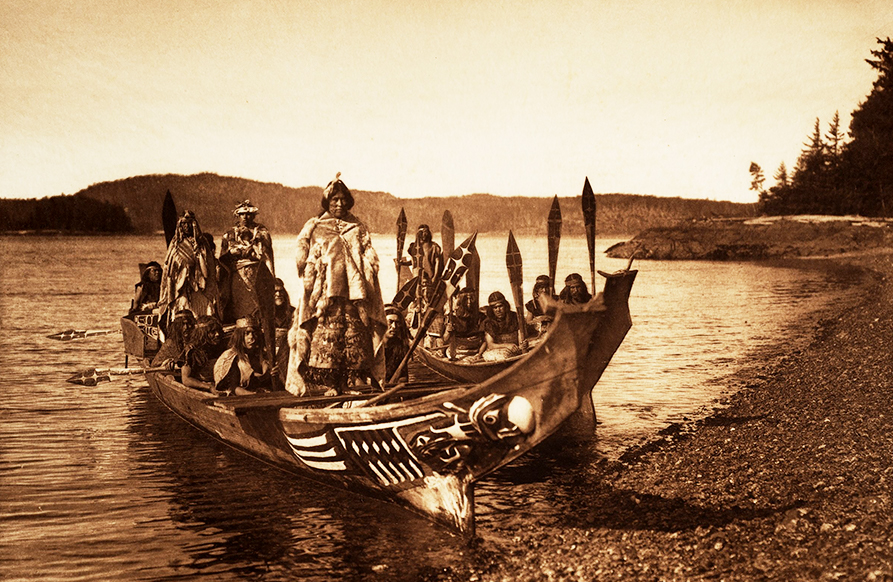 Kwakiutl wedding party, taken c. 1930 by Seattle photographer Edward S. Curtis / Image: public domain
Kwakiutl wedding party, taken c. 1930 by Seattle photographer Edward S. Curtis / Image: public domain
The case of the Kwakiutl is an interesting one, as an example of how an exception to the more common course of development actually confirms the role of production in social development. The main productive activity of the people of the Northwest coast of Canada was not based on agriculture but salmon fishing, which would appear to contradict the notion that class society arose along with the rise of agriculture.
From this the authors draw the conclusion that the “ultimate causes of slavery” are not to be found in the Kwakiutl’s mode of production, but rather in “Northwest coast concepts of the proper ordering of society.”31 Let us take a step back to admire this pearl of wisdom: the social order of the peoples of the Northwest coast was the product of their concepts of the proper ordering of society!
But this tells us nothing about why the Kwakiutl came to consider this the proper ordering of society, which even the authors acknowledge was not the case for all time. As it happens, early European explorers observed that there were “salmon runs so massive one could not see the water for the fish.”32 The salmon grounds would see millions of salmon pass during a salmon run.
Once the ability to harvest and store large quantities of fish was developed, control over these salmon runs and the surplus they were capable of generating became an immense source of power and wealth, much like controlling a highly fertile farming area, which people rely upon to survive. In other words, the presence of a significant surplus in production began to allow for part of society to raise itself above the rest and maintain itself via the exploitation of human labour. This was therefore more similar to a society based on agriculture than the authors would care to admit.
Having been highlighted as the exception, which supposedly demolishes the Neolithic Revolution as a concept, the case of the Kwakiutl actually only deepens our understanding of the developments of production required to give rise to slavery and social classes. That is, if one really wants to understand this process and not mystify it.
The state
In the same vein, chapter ten is titled ‘Why the state has no origin.’ Here we read: “Much like the search for the ‘origins of inequality’, seeking the origins of the state is little more than chasing a phantasm.”33
The authors state: “It is often assumed that states begin when certain key functions of government – military, administrative and judicial – pass into the hands of full-time specialists. This makes sense if you accept the narrative that an agricultural surplus ‘freed up’ a significant portion of the population from the onerous responsibility of securing adequate amounts of food.”34 Thus, they imply that it is just a matter of accepting a ‘narrative’. But how a state is supposed to arise without this condition, the authors never explain.
Like the postmodern game they play with the question of inequality, the authors claim that there is “no consensus” as to what the state “actually is.”35 While they do introduce their own rendering of the Marxist definition (without offering any Marxist quotes or sources, of course), “that states make their first appearance in history to protect the power of an emerging ruling class”, they brush this aside. According to them, the Marxist definition “introduced new conceptual problems, such as how to define exploitation,” a problem apparently so difficult, they do not even attempt to tackle it. Worse still, they add, “it was unpalatable to liberals”, including the authors of The Dawn of Everything it seems.36
Drawing on an earlier book that Graeber wrote with anthropologist Marshall Sahlins in 2017 called On Kings, the authors suggest, “The first kings may well have been play kings. Then they became real kings.”37 As to how they became real kings, we are helpfully informed, “Play kings cease to be play kings precisely when they start killing people.”38 But even if this childishly flippant theory were true, which is never actually established in the book, it does not advance our understanding about how real kings came into being one iota.
Graeber and Wengrow make it clear that they think it’s necessary to do away with the “drab abstractions of evolutionary theory”, like ‘stages’ or ‘modes of production’.39 But the authors are eventually forced to resort to their own. Stuck in their own philosophical dead end, without any factual basis for their theory, they ‘prove’ the eternal existence of the state by way of the following thought experiment (pay attention!):
Imagine Kim Kardashian had a “diamond necklace worth millions of dollars” and wanted to prevent others from taking it. How would she do this?
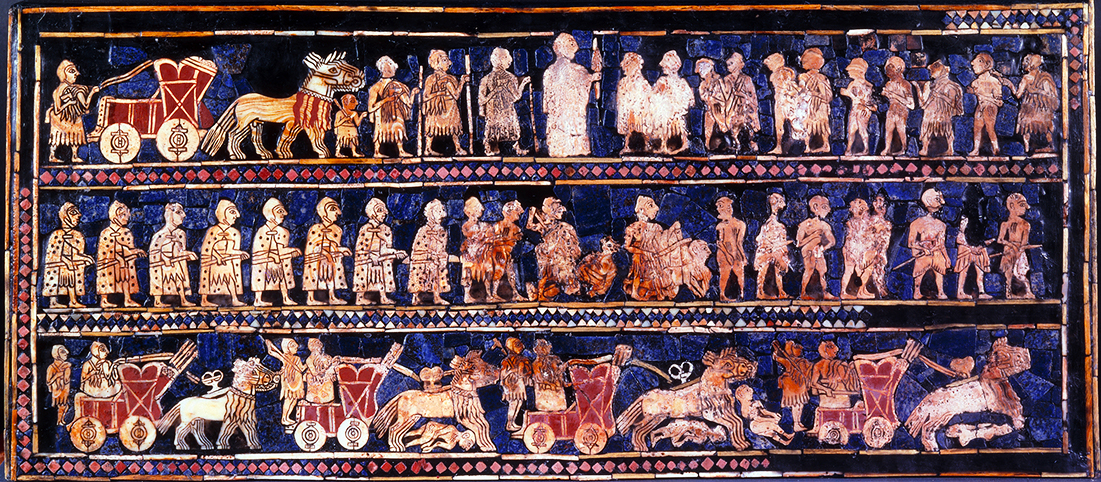 Standard of Ur, 'War' panel (c.2600 BC), from the ancient Sumerian city-state of Ur / Image: public domain
Standard of Ur, 'War' panel (c.2600 BC), from the ancient Sumerian city-state of Ur / Image: public domain
An “armed personal security detail, trained to deal with potential thieves” could do the trick. But what if everyone “drank a potion which made it impossible for anyone to harm anyone else”?
In that case, she might hide her necklace, “in a safe, the combination of which she alone knew and only revealed to trusted audiences at events which were not announced in advance”. Problem solved? Perhaps, unless “everyone on earth drank another potion which rendered them all incapable of keeping a secret, but still unable to harm one another physically as well”.
Faced with this crowd of invulnerable truth-tellers, Kim’s only hope would be “to convince absolutely everyone that, being Kim Kardashian, she is such a unique and extraordinary human being that she actually deserves to have things no one else can”.40
Therefore, having pursued their ‘experiment’ to a successful conclusion, the authors suggest that what we call ‘the state’ is in fact a more or less arbitrary combination of three “principles”: control of violence, control of information, and individual charisma. They then argue that wherever we find any of these “elements” we will find a state.41
Notwithstanding the fact that this ‘proof’ presupposes both private property and inequality, it is completely circular. The criteria have been made as abstract as possible in order to be found anywhere. Such is the power of their “new science of history”.
But amazingly, having ‘proved’ the eternal existence of the state, they then disprove it the moment they are forced to return to the facts, acknowledging that prior to the Neolithic we see none of “the usual trappings of centralised power: fortifications, storehouses, palaces”. “Instead,” they add, “over tens of thousands of years, we see monuments and magnificent burials, but little else to indicate the growth of ranked societies, let alone anything remotely resembling ‘states’.”42
So having been taken around the houses, we eventually return to the very theory that Graeber and Wengrow are trying to disprove: that the state did not always exist, that it therefore has an ‘origin’, and that its origin can be found in the production of surplus upon which social classes eventually arose.
The class struggle
We have seen so far how Graeber and Wengrow got stuck in their own tautologies. But how did humanity get “stuck” in our present “conceptual shackles”? At some point, according to Graeber and Wengrow, people just stopped experimenting and playing around with social structures. Unfortunately, the reason why all of humanity eventually suffered this fate remains a mystery to the authors of The Dawn of Everything. But they are extremely proud to have managed to ask the question.
In fact, the key to answering this question is actually contained within some of the cases they deal with, but is assiduously obscured throughout the text: the class struggle. The absence of the class struggle in The Dawn of Everything is the reason why their arguments about human agency and ‘freedom’ sound so one-sided and abstract. Class society, the state, oppression and exploitation are not simply ‘chosen’, they are imposed by one section of the society on the other.
Taking the example of the indigenous Northwest coast people of Canada mentioned above, Graeber and Wengrow claim that slavery was simply chosen because they considered it to be the “proper ordering of society”. But we can see that the reason for slavery was that the productive technique of harvesting salmon developed to such a degree that at a certain point they were able to produce a significant surplus over and above what was needed to immediately survive. This created not only the possibility of increased class differentiation, but crucially a positive need for intensive labour to ‘harvest’ and process the salmon required to sustain such a surplus.
Eventually, those who controlled the salmon runs had a material interest in enslaving prisoners of war, instead of adopting them into the tribe. It is therefore not surprising, as the authors explain, the slaves “were especially involved in the mass harvesting, cleaning and processing of salmon and other anadromous fish.”43
We see a similar process with the advent of intensive agriculture in Mesopotamia, Egypt, Mesoamerica and other places around the world. From this point on, as Marx and Engels explained, “the history of all society has been the history of class struggle”.44 By no means coincidentally, we find that the period at which we “got stuck” coincides exactly with the rise and spread of class societies.
The examples of Teotihuacan and Uruk raised in The Dawn of Everything also demonstrate that the outcome of particular class struggles are not predetermined in advance; they are a struggle of living forces.
Graeber and Wengrow describe how, as the city of Teotihuacan (situated in modern Mexico) developed from around 100 BC, it went “some way down the road to authoritarian rule”, featuring impressive monumental architecture, such as the famous Pyramids of the Sun and Moon, and the practice of human sacrifice, much like other Mesoamerican civilisations, such as the Maya. But then, around 300 AD, the city “suddenly reversed course”. They add the following significant conclusion: “possibly there was a revolution of sorts, followed by a more equal distribution of the city’s resources and the establishment of a kind of ‘collective governance’.”45
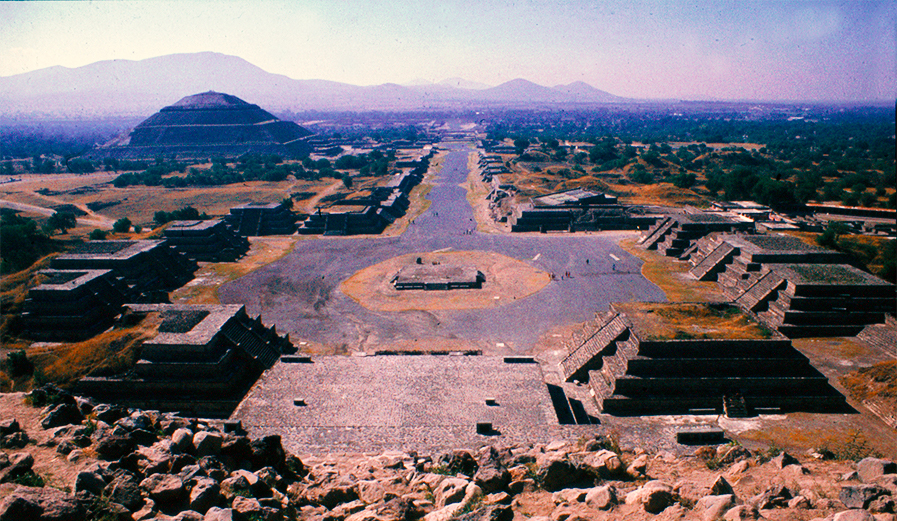 Teotihuacan, Mexico / Image: public domain
Teotihuacan, Mexico / Image: public domain
The ancient Sumerian city of Uruk also saw the rise of a privileged temple bureaucracy, followed by a period of instability and collapse at the end of the 4th millennium BC. Unlike Teotihuacan, however, the temple bureaucracy reappears in the archaeological record, along with full-fledged kings, palaces, and all the other trappings of class society.
The comparison of these two cases, separated so widely in both space and time, tells us something very important. It is very likely that everywhere the attempt of an emerging class of exploiters – such as the temple bureaucracies of Teotihuacan and Uruk – to consolidate their position into a fixed social order was resisted by the exploited masses. Sometimes this struggle resulted in the consolidation of states, which maintained order on this basis, suppressing any attempt to ‘reimagine’ society by force, such as in ancient Sumer.
Wherever class societies and states succeeded in establishing themselves, such as Early Dynastic Sumer, or the Mayan city-states, a powerful ideology of rule grew up, justifying this new order as the “proper ordering of society”. As Marx put it: “The ideas of the ruling class are in every epoch the ruling ideas.”46 Religion changed for example, becoming more hierarchical.
But the result of this struggle between emerging classes did not always end the same way. The example of Teotihuacan shows that at other times the would-be ruling class was defeated, and society returned to function along more egalitarian lines. But eventually, the return to primitive communism was followed by the disintegration of those cities that followed this path, and their replacement either by smaller settlements, or by more developed class societies and states, demonstrating that a deeper necessity was at play.
At Teotihuacan, by around 550 AD, “the social fabric of the city had begun to come apart at the seams... Things seems [sic] to have disintegrated from within. Almost as suddenly as it had once coalesced some five centuries previously, the city’s population dispersed again…”47
All this serves to underline the central point, which Graeber and Wengrow are at such pains to deny, that whilst the fate of individual societies was the product of a struggle of living forces, with many possible outcomes, the overall line of development across the world was towards the strengthening of class rule and states, culminating in the point we find ourselves at today, when inequality, exploitation and oppression are universal.
How can we be free?
The class struggle is therefore essential to understand how we ‘got stuck’. But it also tells us how we can free ourselves.
Graeber and Wengrow tell us that we need to “rediscover the freedoms that make us human in the first place,” starting with reading their book.48 Over time, they hope, academics will be convinced to abandon all their previous materialist theories about social development, and will find their “new truths” to be obvious. “We are optimists. We like to think it will not take that long,” they add.49 But if the conquest of human freedom is dependent on the criticism of academia, we will sadly be waiting forever.
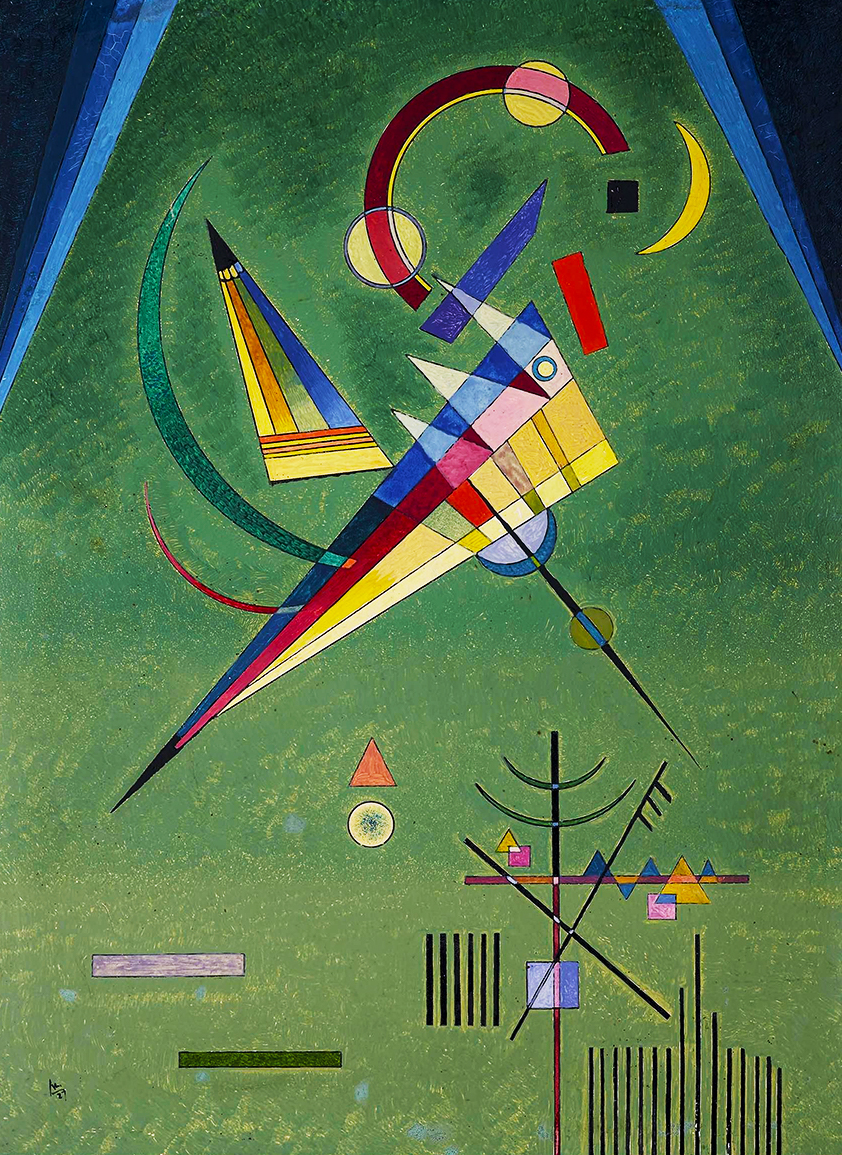 Free (Libre), Vassily Kandinsky (1927) / Image: public domain
Free (Libre), Vassily Kandinsky (1927) / Image: public domain
In fact, it is precisely in the struggle against oppression and exploitation that we will find the road to human freedom. As Marx and Engels pointed out over a hundred years ago:
“... forms and products of consciousness cannot be dissolved by mental criticism, by resolution into ‘self-consciousness’ or transformation into ‘apparitions’, ‘spectres’, ‘fancies’, etc. but only by the practical overthrow of the actual social relations which gave rise to this idealistic humbug; that not criticism but revolution is the driving force of history, also of religion, of philosophy and all other types of theory.”50
Faced with the deepest crisis of the capitalist system since the Great Depression, there is a widespread hatred of the system and a growing movement against inequality and austerity. Many young people are coming to terms with the fact that, if we are to find a way out of this nightmare, we need to overthrow capitalism. A recent poll found that 29 percent of 18-34 year-olds in the UK believe that communism is “the ideal economic system”. Is this not an example of human beings ‘reimagining’ a new social order?
What does this book contribute to this growing movement? The first thing these radical ‘anarchists’ propose is that we should abandon the fight for communism altogether: private property and inequality are here to stay. Instead, we should simply redefine ‘communism’, “not as a property regime but in the original sense of ‘from each according to their abilities, to each according to their needs.’”51
This famous principle of communism is interpreted by Graeber in both The Dawn of Everything and other works as ‘baseline communism’, meaning any instance of sharing, care or kindness in society, such as ‘mutual aid’ or, more concretely, throwing someone a rope if they are drowning (an example used by Graeber). In this way, similar to the authors’ theory of the state, ‘communism’ is simply redefined to mean anything they’d like it to.
But divorcing communism from the notion of common property and then presenting it as its ‘original sense’ is yet another, typical, distortion. Communism has always been associated with common ownership. Even the phrase, “from each according to their abilities, to each according to their needs,” is thought to have come from Morelly, a Frenchman, who states explicitly that under communism all goods would be held in common. Never in history has communism simply meant kind behaviour, or fishing someone out of the sea if they’re drowning.
In fact, Graeber’s so-called ‘baseline communism’ is nothing other than left-leaning liberalism couched in pseudo-radical language:
“The ultimate question of human history, as we’ll see, is not our equal access to material resources (land, calories, means of production), much though these things are obviously important, but our equal capacity to contribute to decisions about how to live together.”52
Instead of ending inequality, we are told we should reorder society so that people are no longer “told their needs are not important, and their lives have no intrinsic worth”.53 Instead of ending exploitation, the sufferings of the poor are to be palliated with a healthy dose of ‘mutual aid’. Instead of fighting to dismantle the bourgeois state, and eventually do away with the state altogether, we should aim for everyone to have an equal say. This is a vision of society that would be welcomed by any NGO, or even the Pope for that matter.
This is not simply an academic debate. All theory is a guide to action, and in this regard The Dawn of Everything serves the purpose of disarming us for the class battles to come. If society is to collectively find a way out of the nightmare we find ourselves in under capitalism, it will be through nothing other than the conscious fight of the working class to transform society.
In this struggle the working class can rely neither on the oppressive power of the state, nor on the limitless wealth of the billionaires, nor on lucrative book deals and promotion by the media establishment, for that matter. Ultimately the workers can rely on nothing but the power of organisation and the clearest, most scientific understanding of society.
This is why for all its ‘radical’ pretensions, The Dawn of Everything is such a poison pill. In its crusade for a fictitious freedom, and its hostility towards a genuinely scientific enquiry into our past, the philosophy of The Dawn of Everything is not just incoherent and fundamentally dishonest; it is reactionary – an enemy of the very human freedom it claims to champion.
We should be optimists, but not for the same reason as Graeber and Wengrow. As this article is being written, millions of workers are fighting against the capitalist system, not because they have just ‘chosen’ to do so, but because they are left with no other choice. They, the majority, have a direct material interest in the overthrow of capitalism, and the control of the means of production by society as a whole for the benefit of all; they have the power to make it happen; and they are becoming more and more conscious of this power as they exert it through struggle.
This is ultimately how we can be free. With the democratic control over the economy, humanity will collectively become the conscious master of our social relations for the first time:
“Man’s own social organisation, hitherto confronting him as a necessity imposed by Nature and history, now becomes the result of his own free action. The extraneous objective forces that have, hitherto, governed history, pass under the control of man himself. Only from that time will man himself, more and more consciously, make his own history – only from that time will the social causes set in movement by him have, in the main and in a constantly growing measure, the results intended by him. It is the ascent of man from the kingdom of necessity to the kingdom of freedom.”54
References
D Graeber, D Wengrow, The Dawn of Everything, Allen Lane, 2021, pg 24
ibid. pg 5
ibid. pg 115
ibid. pg 112
K Marx, The Eighteenth Brumaire of Louis Bonaparte, Wellred Books, 2022, pg 2
K Marx, Marx Engels Selected Works, Vol. 1, Laurence and Wishart, 1962, pg 363
ibid. emphasis added
F Engels, Anti-Dühring, Wellred Books, 2017, pg 136
The Dawn of Everything, pg 206
ibid.
ibid.
ibid. pg 31
ibid. pg 4
ibid. pg 115
ibid. pg 111
ibid. pg 108
M Mauss, Seasonal Variations of the Eskimo, Routledge, 2004, pg 55-56
The Dawn of Everything, pg 108
ibid. pg 87
ibid. pg 88
ibid. pg 163
ibid. pg 161
ibid. pg 160
ibid. pg 54-55
ibid. pg 56
ibid. pg 56
ibid. pg 130
ibid.
ibid. pg 5
ibid. pg 127
ibid. pg 197
ibid. pg 186
ibid. pg 427
ibid. pg 428
ibid. pg 359
ibid. pg 360
ibid. pg 117
ibid. pg 505
ibid. pg 4
ibid. pg 364-365
ibid. pg 365-368
ibid. pg 92
ibid. pg 185
K Marx, F Engels, The Classics of Marxism, Vol. 1, Wellred Books, 2013, pg 3
The Dawn of Everything, pg 332
K Marx, F Engels, Marx and Engels Collected Works, Vol. 5, Lawrence & Wishart, 2010, pg 59
The Dawn of Everything pg 345
ibid. pg 8
ibid. pg 525
K Marx, F Engels, Karl Marx Frederick Engels Collected Works, Vol. 5, Laurence and Wishart, 1976, pg 54
The Dawn of Everything, pg 47
ibid. pg 8
ibid.
Anti-Dühring, pg 336

